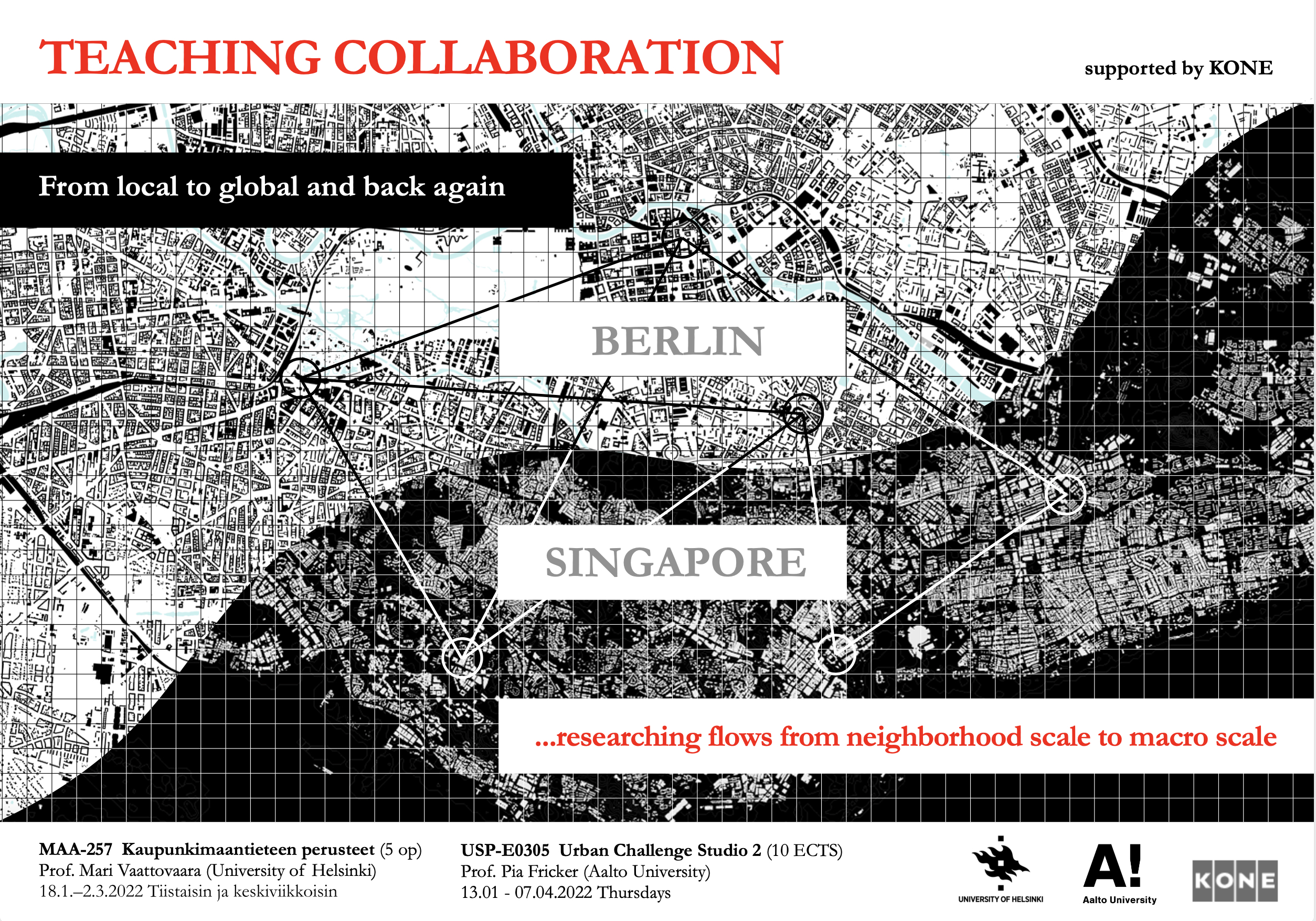USP-E0305 - Urban Challenge Studio 2, Lecture, 13.1.2022-8.4.2022
This course space end date is set to 08.04.2022 Search Courses: USP-E0305
Topic outline
-
From Local to Global and Back Again: Researching Flows from Neighbourhood Scale to Macro Scale

Course Thematics
In many ways, the urban unit/neighbourhood is a mediator that enables the flow of materials, matter, ideas and people. This organizational vessel acts as a local system component in the larger framework of complex adaptive urban systems. Zooming into a local urban unit allows us to understand its inner logic, a well as its external dependencies and relations, which can be visualized through patterns of interactions. Another important aspect is the relationship between global trends, such as ageing population, and local developments.
Two cities have been chosen as the backdrop and focus for Studio 2, namely Berlin and Singapore. Parallel to Studio 2, a course in Urban Geography will be taught at University of Helsinki. Students of both courses will share some moments and have at least one full day of exploring each-others' ways of thinking.
In the first phase of our USP studio 2, you are asked to analyse a specific urban unit in the context of either Berlin, or Singapore, and groups are divided roughly half-half. Each group is given a set of topics to be studied from a local perspective. Central to these topics is the aspect of flow that we will define and redefine. Your findings will be systematically clustered and further post-processed to identify relevant, drivers, facilitators and constraints.
Your goal for the midterm review is to systematically research the principles/mechanisms of the assigned urban unit, and to extract a relevant topic for the final assignment. We look forward to each team articulating a strategy for their urban unit in response to the below listed overarching questions.
In the second phase, the traditional understanding of an urban unit is questioned according to the findings of phase one. The overall goal is to re-think the urban unit as a mediator of environmental, societal, material and activity flows across scales. The aim of the final assignment is to create the climate within which to develop strategies for urban schemes embodying living patterns, and flows in multiple scales. For example, each team has to design a scheme for an urban unit, focusing on multiple zooming-ins and -outs.
Specific questions to be addressed in the final assignment:
How can we think of a built environment as an interwoven collection of inhabitable living systems, and not just as functional components each of which performing an exclusive operation?
What are the dynamics of urban exchange, and how do they simultaneously generate and depend on flows of people, flows of environmental elements, flows of matter, etc.?
How might urban studies and planning respond to renewed interest in the micro-urban scale or the neighbourhood block? Can you propose urban interventions that adequately address micro-level concerns with macro-scale benefits?
Reconfiguring our conception of the city as a complex and adaptive system, requires research bridging the traditional gaps between knowledge domains. This goal will be supported by gaining understanding of the methods for collaboration between disciplines. We will identify flows of impact and patterns of interaction that may or may not have more in common than we think.
Let's appreciate the moments of togetherness!
The Studio 2 team
*** CORONA RESTRICTIONS & TEACHING ARRANGEMENTS ***
As of 14.02.2022, most Corona restrictions have been lifted. Below, the most relevant sections of the associated email [emphasis ours]:
"Dear members of the Aalto community,
The authorities have announced the lifting of the national and regional restrictions on gatherings. Consequently, they will no longer be in force at Aalto University. The message below contains information on campus usage this spring.
As of 14 February 2022, we will be able to use the campus for teaching, events and visits with no specific restrictions on gatherings. It will still be necessary to pay close attention to health security, and until further notice, we continue to recommend the use of face masks in all situations where close contact with others cannot be avoided.
Teaching
In Periods IV and V, starting from 28 February 2022, teaching may be fully carried out on campus according to the previously planned timetable. Flexible teaching arrangements are nonetheless recommended, to ensure all students (risk groups included) the opportunity to participate in teaching events. Further information on the teaching arrangements at the end of Period III and Periods IV and V is available on the Aalto website https://www.aalto.fi/en/aalto-university/internal-instructions-related-to-coronavirus.
Self-study spaces and the Learning Centre will resume regular opening hours. Student association spaces, for example, may also be used. More detailed instructions on the use of guild rooms online https://www.aalto.fi/en/aalto-university/internal-instructions-related-to-coronavirus.
Aalto University
Crisis Management Team (CMT)"For Studio 2 this means that we will be switching to a hybrid model. Both the Thursday morning plenary sessions and the afternoon tutoring sessions will be organised on campus. The locations will be announced in the weekly updated Schedule, so be sure to check that section regularly. We sincerely hope that all who can attend on location will also do so. For those who cannot attend on location, the morning sessions will be streamed through Zoom, as before. The afternoon tutoring sessions will be organised more "organically" and less according to a strict schedule. For the tutoring sessions, groups will be asked to arrange their own virtual work space in order to communicate with remote group members.
Unless the situation changes, this arrangement will remain in place until the end of the course. Any updates will be reported here. More information about the course timeline and weekly schedule can be found in the Schedule section. Zoom links are located under Materials & Links > Zoom links.
